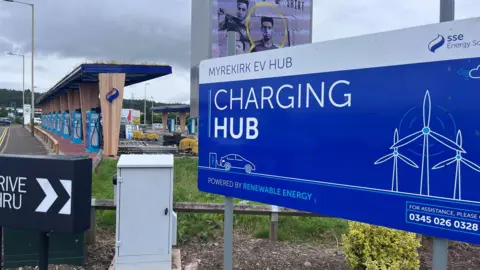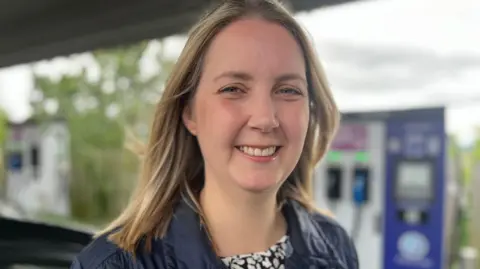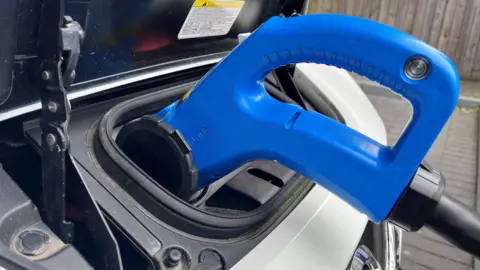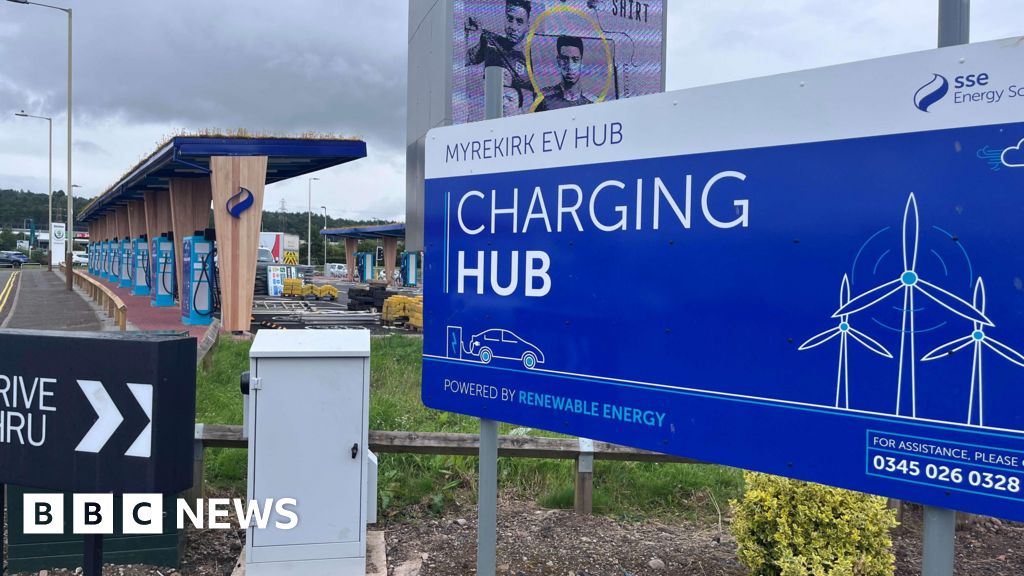By Kevin Keane, BBC Scotland’s environment correspondent
 BBC
BBCScotland’s most powerful charging “super-hub” for electric vehicles is being opened in Dundee.
The site – off the Myrekirk roundabout on the Kingsway – contains 24 ultra-rapid charging bays, eight of which can provide up to 60 miles of driving range in three minutes.
It comes just 18 months after BBC Scotland revealed that a quarter of the country’s publicly-owned chargers were recording faults.
The body representing drivers – EVA Scotland – says the situation is improving but rural charging is still a challenge.
Having previously invested millions in creating a public charging network, Scottish ministers said significant private investment would now be needed to continue its growth.
Figures from the charger mapping service Zapmap show a 43% increase in the number of public chargers in the year to June 2024, taking the total number to 5,663.
Of the 1,709 new chargers which were installed, 77% were privately funded.

The Scottish government says it will now open up a £7m fund to encourage more private investment in Tayside, the north east and the Highlands.
It says the money will have a particular focus on rural areas.
Elinor Chalmers, an early adopter of EVs who has been driving one since 2015, says having vehicles with larger batteries means she’s able to be less reliant on public chargers.
But she says she’s shocked by how expensive public charging has become, often ten times more expensive than charging at home.
She added: “The hubs are fantastic. It just builds in that little bit more reliability that when you turn up to a hub, there’s a good chance there there will be a charger available.”
‘Left behind’
The new charging hub in Dundee will have a total capacity of almost 2.5 megawatts which is enough electricity to boil about 1,000 kettles at the same time.
The largest super-chargers will be seven times more powerful than the average rapid device.
SSE, which has built the “superhub”, says it plans to install around 500 across the UK and Ireland by 2030.
Managing director for enterprise Neil Kirkby said the new hub supports the commitment by the city of Dundee to install “fast and reliable ultra rapid EV charging infrastructure for drivers and fleet owners.”

EVA Scotland, which represents electric vehicle drivers, says the charging network presents a mixed picture depending where you are in Scotland.
They want councils to require operators to build in less popular areas as a condition of access to potentially busier locations.
Director Neil Swanson said: “The challenges are the rural networks where we are striving to make sure that people aren’t left behind. The incentive for the commercial operators to go into rural areas is limited and it’s really up to local authorities.”
Figures from Zapmap show that the majority of Scotland’s network – 52% – is still part of the publicly-funded ChargePlace Scotland network.
But its dominance has shrunk significantly in the last year, down from 63% in June 2023.
It says the bulk of the newly-installed high-powered network has come from the private sector.
Jade Edwards, head of insights at Zapmap, says Scotland has ranked third behind London and the south east for the number of charge points since 2018.
She added: “However, over the last year, Scotland has experienced the fastest growth in high-powered chargers of these three areas, making it easier for electric car drivers not only to travel longer distances, but to enjoy Scotland’s scenic routes and destinations with greater confidence and convenience.”
Sales of electric vehicles have slowed since the previous Prime Minister Rishi Sunak pushed back the date for ending sales of new petrol and diesel cars from 2030 to 2035.
During the general election campaign, Labour committed to reinstating the target.
Scotland’s transport secretary Fiona Hyslop says they are on target to install 6,000 chargers by 2026 and plan to have 24,000 charge points by 2030.
She said the private sector had invested between £40m and £55m in public EV charging in Scotland in 2024 adding “This can only happen, however, if the conditions exist to support this investment.”
The Scottish government says it will publish an implementation plan for the 2030 target by the end of this year.


